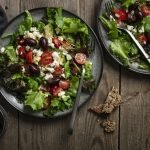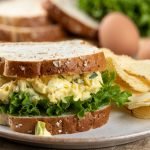Supermarkets and stores are filled with supposedly “healthy” foods to help people live their best lives, but if you asked a nutritionist if they would keep those items in their own pantry or fridge, the answer might surprise you. Although you might think you’re finding a shortcut around that sugar or those calories, the reality is that many of these foods are marketed to seem healthy, but they’re not. Nutritionists know best, after all — they’ve been professionally trained and counsel people on it for a living. Here are all the “healthy” foods that nutritionists avoid, and you should too
1. Light mayo

Next time you’re tempted to pick up the low-fat version of mayonnaise, be aware that light mayo, along with any other “low-fat” or “light” products, is filled with added sugar and additives to make up for the taste that’s long alongside the fat. Higher fat allows you to absorb nutrients better, so there’s no harm in eating it.
2. Diet soda

You’d be sorely mistaken if you think you’re saving your body by drinking diet soda instead of regular soda. While you are ultimately eating fewer calories and sugar, diet soda is filled with artificial sugar substitutes, which can actually cause weight gain and diabetes in the long term.
3. Coconut oil

With meat alternatives like Beyond Meat being packed with coconut oil, it’s becoming more apparent that large amounts of this ingredient aren’t exactly healthy, since coconut oil is high in saturated fats. Instead, nutritionists recommend eating more monosaturated fats like canola, avocado and olive oil.
4. Fat-free cheese

Although cheese can be high in saturated fat, it’s also packed with calcium and protein. Moderation is key with this food, but the alternative, known as fat-free cheese, lacks the added nutritional benefits and tends to be rubbery or flavorless. It also is not great at melting.
5. Acai bowls

A staple at many “healthy” cafes and eateries, Acai bowls are actually packed with more calories and fat than a fast food meal, even though they technically contain good-for-you ingredients. The serving of nut butters, coconuts, fruits and other healthy fats and sugars are fine in small amounts, but the serving size of Acai bowls makes it kind of similar to drinking a milkshake.
6. Flavored yogurts

With so many flavored yogurts touting probiotic benefits, you might think these sweet yogurts make a great dessert replacement. And while plain yogurt does have health benefits, the flavored alternatives are filled with so much sugar, you might as well eat a regular dessert! “Light” yogurts with zero sugar are also a red flag since they can cause gastrointestinal issues and contain artificial ingredients.
7. Kombucha

This might come as a shock, but kombucha actually imbalances your gut even more since it’s made with fermented yeast, and a lot of people suffer from an overgrowth of yeast. Instead, it’s better to eat naturally fermented foods such as sauerkraut, kimchi, kefir and pickles.
8. Protein cookies

You might think that protein cookies are a lot better for you than regular cookies, but they’re just as processed. While they might be infused with additional protein or vitamins, in reality, they’re just a more expensive version of regular cookies and have a similar nutritional profile.
9. Granola

Granola has a lot of healthy connotations, but it’s also filled with more sugar, calories and fat than you need. While a quarter or half cup is fine with some Greek yogurt or milk, just a cup contains up to 600 calories per cup. Be sure to read the labels to see the sugar and saturated fat content per serving.
10. Cool whip or low-fat whipped cream

Whipped cream is certainly a decadent indulgence, but it’s better to enjoy it in small amounts (no more than two tablespoons) because the artificial versions can be filled with nightmare ingredients like hydrogenated oil and high-fructose corn syrup.
11. Canned soup

When you don’t have the time to whip up your own fresh soup at home, there’s no harm in eating a canned alternative, right? But besides getting that tinny taste, you’re also eating a ton of sodium. Many of the nutrients are also lost in canned soup. Luckily, low-sodium soup is a preferable alternative.
12. Oat milk

Unfortunately, this food doesn’t have the same benefits as eating oatmeal. Although some vegans might prefer it, oat milk is generally higher in fat and calories than regular dairy milk, and it’s also lower in protein.








